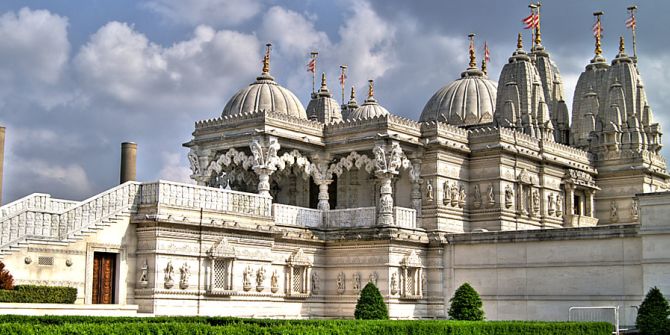As part of a study of religious unbelief in oral history archives, the British Library’s Paul Merchant has discovered examples of ‘hybrid configurations’ of unbelief among British Hindus recorded in the BBC’s ‘Millennium Memory Bank’, challenging a simplified believer-unbeliever binary.

At the British Library – accessible through its Listening and Viewing Service – there is a rich, untapped resource for those interested in religion and global society. Called Millennium Memory Bank, it is a collection of 5,439 life story interviews with people across the UK, aged between 5 and 107, from a range of social, ethnic and religious backgrounds, recorded in 1998 and 1999 in the BBC’s Millennium Oral History Project – ‘The Century Speaks’.
As part of a study of unbelief in oral history collections, supported by National Life Stories and the Understanding Unbelief programme at the University of Kent, I have been searching Millennium Memory Bank for moments in which interviewees from non-Christian backgrounds – often born in countries other than the UK – talk about not believing in God and/or their lack of engagement with religion. In particular, I have attended to what Understanding Unbelief calls ‘hybrid configurations’ of unbelief within individuals:
Disaggregating ‘unbelief’ […] encourages a move away from more bounded forms of holistic thinking in which some people are described as religious and others as nonreligious – or as believers and unbelievers. Rather, we can start to imagine and document more ‘hybrid’ configurations in which a single individual might have, say, a materialist conception of life and the afterlife, derive other existential beliefs about what matters in life from a Catholic background, and hold ethical principles informed by a degree of relativistic agnosticism and the sense that humans should not exert undue influence over the lives of others.
Some interviewees for whom Hinduism was a significant feature of their childhoods exemplified such ‘hybrid configurations’. From an interview with the then (1999) Chairman of the Bristol Hindu temple, who had migrated from Kenya to the UK in the early 1960s:
I’m not religious.
And yet you are Chair of the Hindu temple?
Yes.
Tell me about that.
[…] I am a Hindu – by birthright I am a Hindu, I feel I am a Hindu, and I believe that when I am in trouble I will say to Lord Shiva that, ‘God, please give me guidance’. […] I will go to the temple, but I don’t believe in the rituals that take place. I don’t think its religion.
Do you think if you’d stayed in a largely Hindu community, you would have not changed?
You mean would I have been brainwashed totally if I [laughs] because I think religion is brainwashing; I genuinely believe. I think it – I think if you’ve got a conscience and you believe […] that you should not harm somebody else […] I think then that’s religion […] and I think that is my religion. [C900/00631, BBC Copyright]
We have, in this extract, representation of the self as ‘not religious’ but in possession of a form of religion (‘my religion’), and a lack of belief in aspects of Hinduism but reference to ‘God’. He appears to agree with the interviewer’s suggestion that his mix of religion and non-religion, belief and unbelief, is partly due to movement across the globe (aged 17, alone) from Kenya (where ‘it was always families and extended families’) to the UK (‘totally different country, total freedom’).
Other interviewees state more directly what is implied in the above – that, for them, Hinduism is a particular set of beliefs which have to be ‘questioned’ on the way to a belief in more ‘basic truths’. The following extract is from an interview with someone who was born in the UK to parents who had migrated from India in the 1960s and for whom going away to university (where she encountered ‘multicultural groups and different people […] it really opened your mind up’) generated the mix of belief and unbelief that she presents in the interview:
My parents are Hindus but I wouldn’t actually call myself a Hindu. […] I think all the religions if you look at throughout, through them, different people have come at different times, like Buddha and Mohammed, […] to be messengers to teach certain basic truths. […] And I feel that my, sort of, view about spirituality is very different from my parents because they’re still into Hinduism and things like that, and they don’t always questions things, whereas I kind of feel that I’ve just gone beyond, beyond all that. And to me I really appreciate Hinduism, I really appreciate the energies of the different gods and things like that, and the goddesses and everything, but it’s not the religion. [C900/07617, BBC Copyright]
In the final example, a nineteen-year-old interviewee combines non-religion (I don’t actually say I really, really believe in this religion’) and atheism (‘I wouldn’t say I look up to a God’) with a belief in reincarnation that partly derives, she says herself, from the teachings of parents who had brought their Sikhism (father) and Hinduism (mother) from India to Reading (where she was born):
I was taught when I was little that with reincarnation, you die and you come as a different form and sometimes I think that things that happen to me like déjà vu might have happened in a different life. […] Some of the knowledge I have sometimes baffles me, and I’m thinking: I’m only 19, how can I know that type thing […] and you think that when you started life it wasn’t just the beginning, you had come from something else. [C900/07560, BBC Copyright]
These brief extracts from Millennium Memory Bank offer examples of ‘hybrid configurations’ of unbelief. In particular, they demonstrate the continuity and change that is often part of the diaspora experience in the UK.
About the author
Dr Paul Merchant is an oral history interviewer for National Life Stories at the British Library. His research interests are in the recent history of science, relations between science and religion and, most recently, religious unbelief.
Note: This piece gives the views of the author, and not the position of the LSE Religion and Global Society blog, nor of the London School of Economics.





